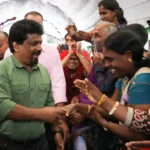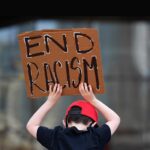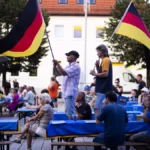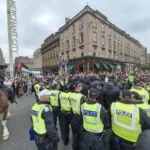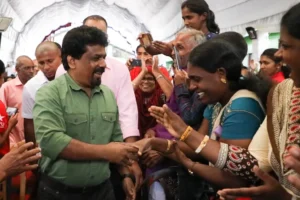Police use water cannon, horses as hundreds attempt to block Ayalon Highway; former Likud minister urges her party’s MKs to oppose overhaul: ‘Why do you stay silent?’
Hundreds of thousands of people rallied throughout Israel Saturday in the ninth straight weekend of protests against the government’s efforts to radically transform the judiciary, with some 160,000 estimated in Tel Aviv and tens of thousands more in dozens of locales.
Organizers claimed that their counts throughout the country indicated some 400,000 protesters in all, though this could not be independently confirmed.
As the main Tel Aviv rally ended, limited clashes once again erupted between police and some demonstrators, as the latter broke through barriers to enter the Ayalon Highway — action police and National Security Minister Itamar Ben Gvir had vowed to prevent.
Police used horse-mounted cops and water cannons against the demonstrators as they sought to disperse them, with the Haaretz news site reporting that this had happened while the protesters were leaving the highway anyway and was not preceded by violence. Officials said at least four were detained. The highway was eventually reopened for traffic after around an hour of closures.
At the same time, protest leaders announced that Thursday, March 9 would serve as the next “day of disruptions” around the country — a repeat of events this past Wednesday when protests and road blockages took place throughout the country, with violence between police and some protesters in Tel Aviv.
Speaking earlier at the Tel Aviv rally, former Likud minister Limor Livnat jokingly greeted demonstrators with the names they’ve been called by Ben Gvir and other opponents: “Good evening ‘anarchists,’ good evening ‘terrorists‘ — good evening patriots.”
Lashing Prime Minister Benjamin Netanyahu for, in her view, abandoning the liberal values on which both were raised, Livnat called the overhaul “a coup” and urged Likud MKs to speak up. “You hear it all, you see it all, you know and understand where all of this is leading — why do you stay silent?”
World-renowned historian Yuval Noah Harari also addressed the Tel Aviv demonstrators, saying the government members “don’t know who they’re messing with.” He said the current fight over the overhaul “is a historic test for Israelis, and there are no retakes.” He called on educational institutions to halt all academic studies “and talk only of democracy, of human rights and freedom.
“Democracy is a deal whereby citizens must respect the decisions of the government — on the condition that the government maintains the basic freedoms of the citizens,” he said. “When one side breaks the deal, the other side is no longer obligated to it.”
Arriving at a police command center near the protest, Ben Gvir once again referred to protesters as “anarchists.”
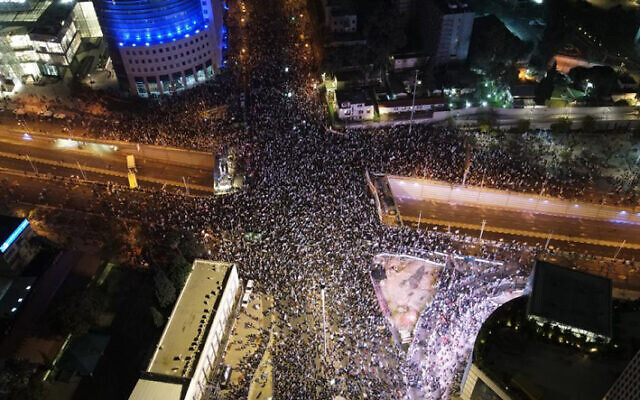
“I came here to exercise my policy. I have no intention of apologizing to anyone, certainly not to the anarchists who want to set the state of Tel Aviv on fire,” he said.
Ben Gvir said the right to demonstrate was “sacrosanct” but that he would not allow blockages of main roads or violence.
Opposition chief Yair Lapid reacted by accusing Ben Gvir of trying to escalate the violence at the demonstrations.
“The dangerous TikTok clown is continuing to incite and encourage violence,” Lapid tweeted. “There has never been a government minister who openly sought to create violent clashes between the police and citizens.”
Channel 12 news reported that Police Commissioner Kobi Shabtai had proposed letting the demonstrators block Ayalon for a bit, but the Tel Aviv District commander Amichai Eshed said he didn’t want to let them do that.
Large protests were seen Saturday in Jerusalem, Herzliya, Netanya, Beersheba, Haifa and more, with reports indicating numbers continue to grow from week to week. Organizers said rallies were held in nearly 100 locations in all.
In Ashdod, Yisrael Beytenu party chief Avigdor Liberman attended his first protest, saying that within two months of its formation, “the government has led the entire country into chaos.”
Liberman said that within weeks, the country could face “an unprecedented constitutional crisis” if the judicial overhaul bills pass and the High Court declares them illegal.
Liberman said that if this were to occur, President Isaac Herzog “must stand before all Israeli citizens and say clearly that all national institutions and their leaders must adhere first and foremost to the rulings of the Supreme Court.”
In Modiin, thousands demonstrated near the home of Justice Minister Yariv Levin, the main architect of the judicial overhaul plan.
Some 250 took part in a protest in the West Bank settlement of Efrat — more than doubling in size compared with previous weeks. Counter-protesters gathered across the road.
In Tel Aviv, the main event began at Dizengoff Center at 6 p.m. with a march toward Kaplan Street. Police closed off a number of Tel Aviv streets starting at 5 p.m.
Former Labor party minister Yuli Tamir headlined the Jerusalem protest outside the President’s Residence. Labor party leader Merav Michaeli spoke at the Haifa rally along with former Supreme Court justice Ayala Procaccia and former Meretz MK Gaby Lasky. Lapid and retired judge Hila Gerstel appeared at the Herzliya rally, while National Unity party leader Benny Gantz spoke in Beersheba.
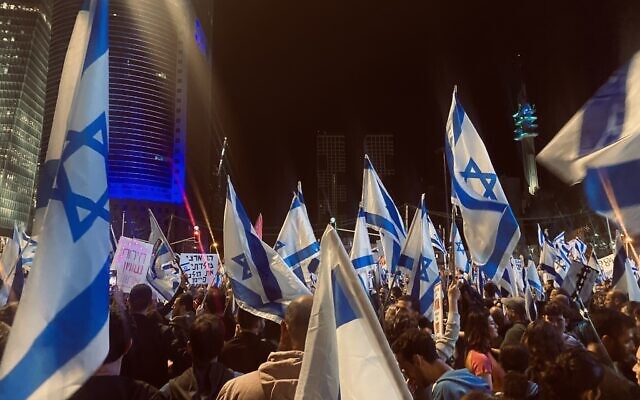
Police’s conduct was being watched during Saturday’s rallies. The force came under criticism this week for its rough treatment of protesters in Tel Aviv on Wednesday, including for an officer who hurled a stun grenade into a crowd of people. The Justice Ministry’s Police Internal Investigations Department has opened a probe into the incident.
Ahead of Saturday’s rallies, Shahar Mor, the protester whose ear was mangled by one such grenade during Wednesday’s demonstrations, accused police of brutality and hooliganism.
Speaking to Walla news from Ichilov Medical Center in Tel Aviv where he was still being treated, Mor said he had been far from clashes and violence when he was hit by the grenade.
“I was sure I’d been shot. I was stunned… It exploded right on my skull. Police behaved brutally, with disdain for human lives,” he said. “It smashed my ear. It could have exploded in my eye. I got off easy. Next to me was a mother and her 14-year-old daughter. How can you hurl a grenade into a crowd?”
He added: “The commanding officer there behaved like a barbarian, a hooligan, throwing grenades at people who weren’t being violent… Police do this all the time, I was just filmed.”
On Thursday, famous veteran singer Shlomo Artzi broke weeks of silence during a concert in Tel Aviv, after many had urged him to speak out about the current crisis.
“For a week, I’ve been hearing [questions] from all directions about whether I’m afraid to make my voice heard,” Artzi told the crowd. “I always thought my opinions are deep in my songs. But we are in a situation in which I genuinely fear what will become of us, the speed in which this is happening, the changes, that this will take the character of who we are.
“I’m scared of what’s happening in the country, which is changing its face,” he added, in a reference to lyrics written by the late songwriter Ehud Manor.
The weekly protests started shortly after Justice Minister Yariv Levin announced the proposals to curtail Israel’s judiciary.
Critics say the proposed overhaul will weaken Israel’s democratic character, remove a key element of its checks and balances, and leave minorities unprotected. Supporters say it is a much-needed reform to rein in an activist High Court.
Source: Time Sofisrael

